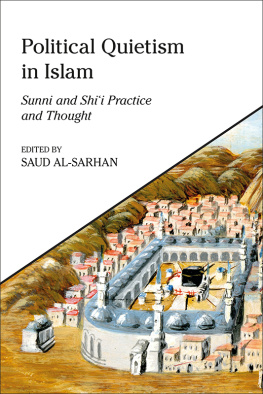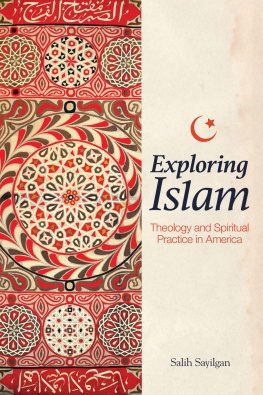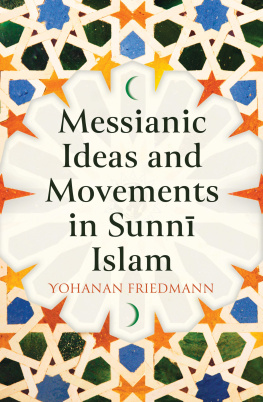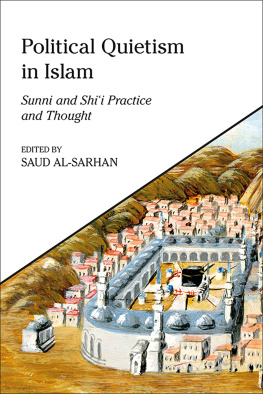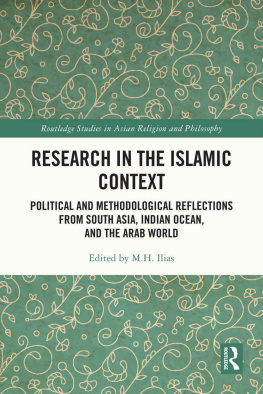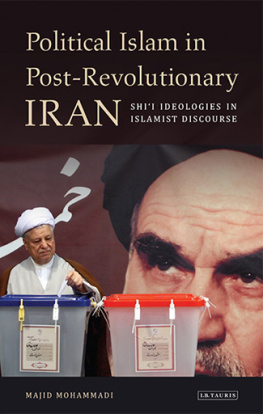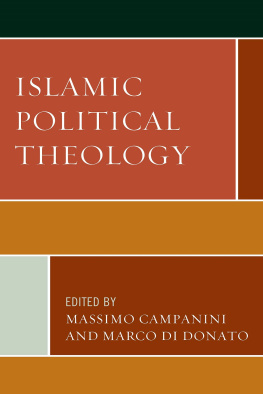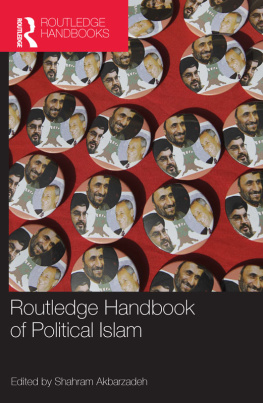Political Quietism in Islam
Political Quietism in Islam
Sunn and Sh Practice and Thought
Edited by Saud al-Sarhan

Saud al-Sarhan (PhD, University of Exeter) is Secretary General at the King Faisal Center for Research and Islamic Studies (KFCRIS) in Riyadh, Saudi Arabia. He was previously the Director of Research at KFCRIS. He is also an Honorary Senior Research Fellow in the College of Social Sciences and International Studies at Exeter University, UK, an Associate Fellow at the International Centre for the Study of Radicalisation (ICSR) at Kings College London, and a Distinguished International Affairs Fellow of the National Council on US-Arab Relations, USA.
Fuad Aliyev (PhD, Azerbaijan State University of Economics) is an expert on Islam in post-Soviet countries and Islamic political economy. He was the Fulbright Scholar in 201112 at the John Hopkins University School of Advanced International Studies, Central AsiaCaucasus Institute. He was a Hubert Humphrey fellow in 200506, affiliated with the University of North Carolina in Chapel Hill and with the Brookings Institution. Dr. Aliyev teaches at ADA University and Khazar University in Azerbaijan. He has written several publications on Islamic economics and finance, the political economy of transition, and economic reforms.
Rainer Brunner (PhD, University of Freiburg) has been Director of Research at the CNRS and PSL Research University Paris (Laboratoire dtudes sur les monothismes) since 2005. Prior to that, he was a fellow at the Institute for Advanced Studies at the Hebrew University of Jerusalem; a member at the Institute for Advanced Study in Princeton, New Jersey; and more recently, visiting professor for Islamic Studies at the University of Heidelberg. He also serves as editor of the journal Die Welt des Islams (Leiden). His main research areas are Sh Islam, SunnSha relations, Islamic modernism, and the history of Islamic studies.
Alessandro Cancian (PhD, University of Siena) is Senior Research Associate in the Quranic Studies unit at the Institute of Ismaili Studies, London. He is a review editor for the Journal of Shia Islamic Studies, and has edited and published articles and papers, contributed book chapters and encyclopedia entries, and delivered numerous lectures. His areas of interest and expertise are the intellectual history of Shism, Sh Sufism in early modern times, the anthropology of Islam, and Shism and modern Iran. He is currently working on a Sh mystical exegesis of the Qurn, its influences, and reception in modern times and on a monograph on Suln Al Shhs Tafsr Bayn al-sada.
Magomed Gizbulaev (PhD, Dagestan Scientific Center of the Russian Academy of Sciences) is Research Fellow in the Department of Ancient and Medieval History of Dagestan, Institute of History, Archaeology and Ethnography, Dagestan Scientific Center of the Russian Academy of Sciences. His research interests include the history of the medieval Caucasus, Islamic intellectual culture in Dagestan, Russian-Dagestan relations after the Great Caucasian War, and early Arabic historical and geographical sources of Caucasian history.
Robert Gleave (PhD, University of Manchester) is Professor of Arabic Studies and Director of the Centre for the Study of Islam, Institute of Arab and Islamic Studies, University of Exeter. His areas of research are Islamic law and legal theory, with a particular emphasis on the history of Sh jurisprudence. He is currently the director of two projects: Understanding Sharia; and Law, Authority and Learning in Imami Shiite Islam. He is the author of Inevitable Doubt: Two Shii Theories of Jurisprudence (2000), Scripturalist Islam (Brill 2007), and Islam and Literalism (2012).
Jan-Peter Hartung (PhD, University of Erfurt, and Senior PhD, University of Bonn) is currently an ERC senior research fellow at the Institute of Social Anthropology at the University of Goettingen, Germany. Prior to that, he taught the study of Islam at the universities of Erfurt, Bonn, and Bochum, all in Germany, and for a decade at SOAS, University of London. His most recent monograph is A System of Life: Mawdd and the Ideologisation of Islam (London and New York 2013); he is currently preparing a book manuscript on the religious trajectories that led to the emergence of the Taliban and a special issue on Salaf Islam outside the Near and Middle East for Die Welt des Islams.
Jeremy Kleidosty (PhD, University of St. Andrews) is Researcher at the University of Helsinkis Centre of Excellence on Reason and Religious Recognition. He specializes in constitutionalism and the comparison of political norms, institutions, and texts across wide swaths of time and space with a focus on how philosophy and political theory influence their development, legitimacy, and effectiveness. His research highlights the cross-fertilization of these political ideas and norms from the Middle Ages onward, and demonstrates that comparative political theory offers tools that go beyond dialogue to create new hybrid ideas to better serve todays increasingly interconnected and global communities while still respecting local narratives and traditions.
Laila Makboul (PhD candidate, University of Oslo) holds an MA in Middle Eastern and North African Studies from the University of Oslo. Her main field of research and the subject of her PhD thesis are the discourse and practice of intellectual female preachers in Saudi Arabia.
Christopher Melchert (PhD, University of Pennsylvania) is Professor of Arabic and Islamic Studies at the University of Oxford. He has written over sixty articles in journals and edited collections. His first book, The Formation of the Sunni Schools of Law, Ninth-Tenth Centuries C.E., was published in 1997; his second, Ahmad ibn Hanbal, came out in 2006. He is presently at work on Before Sufism: Early Islamic Renunciant Piety.
Ebrahim Moosa (PhD, University of Cape Town) is Professor of Islamic Studies in the Keough School of Global Affairs at the University of Notre Dame. Moosa is the author of What Is a Madrasa? (2015), as well as the prize-winning book Ghazali and the Poetics of Imagination (2005). He coedited Islam in the Modern World (2014) and Muslim Family Law in Sub-Saharan Africa: Colonial Legacies and Post-Colonial Challenges (2010). He also edited the last manuscript of the late Fazlur Rahman, Revival and Reform in Islam: A Study of Islamic Fundamentalism (2000).
Nicholas Roberts (PhD candidate, University of Notre Dame) dissertation focuses on modern Omani history and Ibadi political theology. His publications include Political Islam and the Invention of Tradition (2015).
Walaa Quisay (PhD candidate, University of Oxford) is researching neo-traditionalist religious scholars in the West. She is a visiting research fellow at Istanbul Sehir Universitys Sociology Department.
I would like to acknowledge here, briefly, the work of others who have helped bring this collection to life. Any book is the work of many more than just its author, a collected edition even more so. I would like to acknowledge and thank first and foremost the King Faisal Center for Research and Islamic Studies in Riyadh for supporting the publication of the book, as well as for their support of the Annual Islamic Political Thought Conference. Faisal Abualhassan has been helpful every step of the way. In addition, the encouragement of Iradj Bagerzade until his retirement last year was an unparalleled source of support. Finally, I would like to thank Natana Delong-Baz for her comments on an early draft of the book.
Next page
